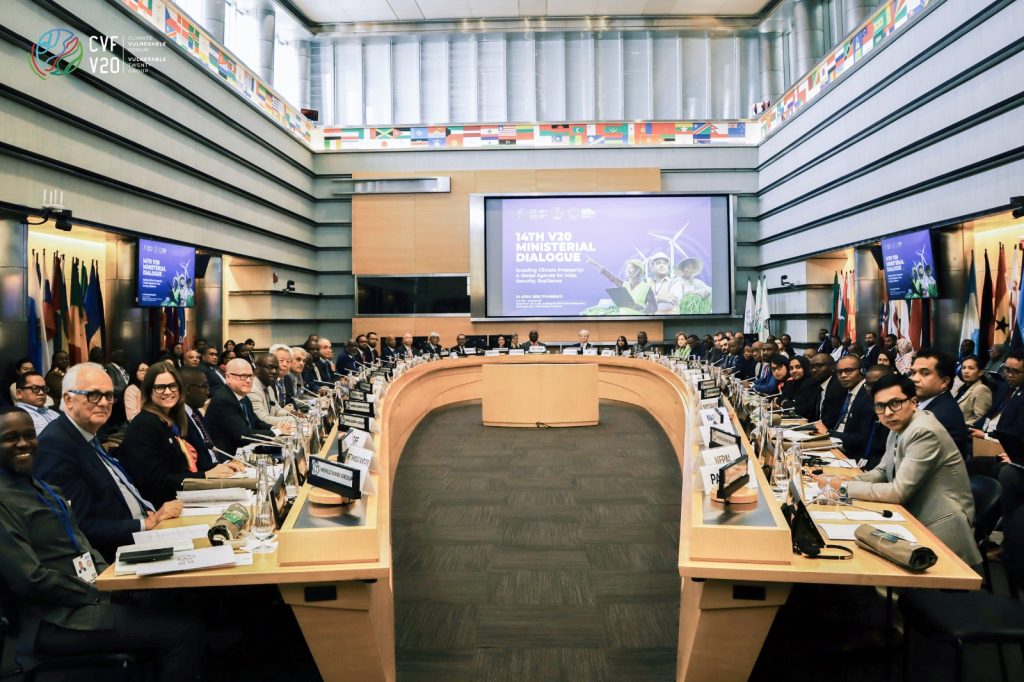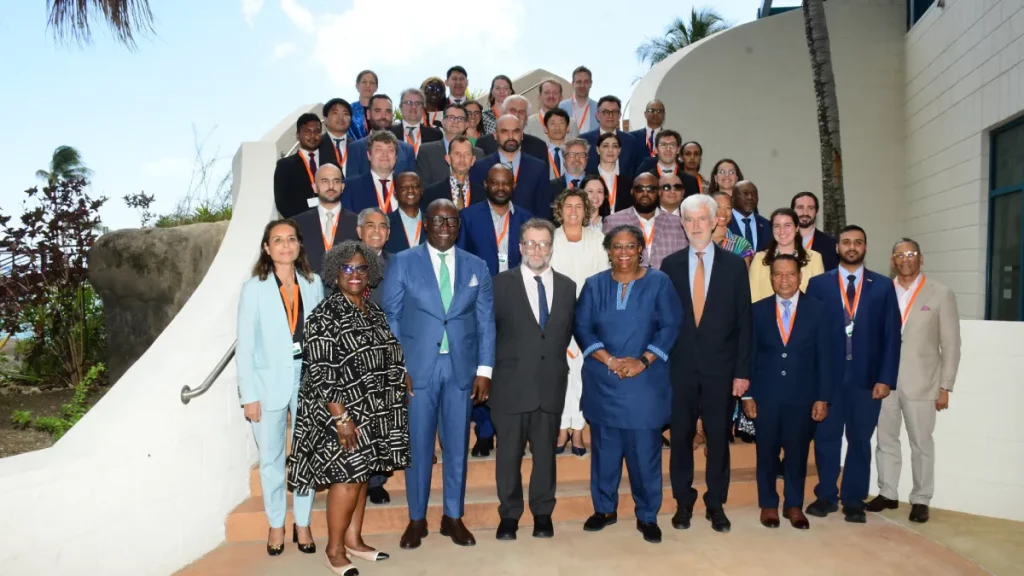[vc_row][vc_column][vc_single_image image=”19288″ img_size=”full” parallax_scroll=”no”][vc_raw_html]JTNDcCUyMHN0eWxlJTNEJTIydGV4dC1hbGlnbiUzQSUyMGNlbnRlciUzQiUyMiUzRSU1QmFjZiUyMGZpZWxkJTNEJTIyaW1hZ2Vfc291cmNlJTIyJTVEJTIwJTVCYWNmJTIwZmllbGQlM0QlMjJsaWNlbnNlXyUyMyUyMiU1RCUyMCU1QmFjZiUyMGZpZWxkJTNEJTIyaW1hZ2VfbmFtZSUyMiU1RCUzQyUyRnAlM0U=[/vc_raw_html][vc_column_text text_larger=”no”]
Climate Vulnerable Forum Leaders Dialogue COP26
4:15 – 6:15 pm 2 November 2021 – UNFCCC COP26, Glasgow, Scotland
Intervention by H.E. Milagros De Camps
Hon. Deputy Minister of International Cooperation of the Ministry of Environment and Natural Resources of the Dominican Republic
Representing H.E. Dr. Max Puig, Executive Vice President of the National Council of Climate Change of the Dominican Republic, the Minister of the Environment of Dominican Republic,
Thank you very much, distinguished hosts and guests,
I am the Minister of the Environment of the Dominican Republic. As an island neighboring the Republic of Haiti, Dominican Republic is one of the top 10 to 14 countries that will be most affected worldwide by the extreme events that are forecast, mainly floods, droughts, and rising sea levels. It is therefore our priority to become resilient. We have done and are doing everything within our reach. We increased our ambition in our NDC, we reduced 7% of unconditioned GHD emissions with the intention to become carbon neutral by 2050, and our new improved ambition is 27%. We have been focusing on transforming our energy matrix. We currently have 30% of renewables and have a promise to include by the next year another gigawatt of renewables in our matrix, and we have recently become a regional leader in terms of electric mobility.
Increasing our forest coverage, our reforestation efforts are focused on coastal resilience planting mangrove trees along the coast of the country, developing a blue economy, and signing an emission reduction purchase agreement with a very unfavorable price – I might add-. Right before coming here we launched an initiative with Columbia about fair prices in the carbon markets. However, the totality of our emissions reductions have now been sold for $5 per credit. We have also been increasing our protected areas, both Marine and land, restoring degraded sites, protecting our biodiversity and developing a sustainable financial system that guides investment towards climate action, diversifying the existing framework of financial instruments to become vulnerable and be able to finance it ourselves. Despite these efforts, the challenges, and I think it was mentioned before by our friends from Maldives, are the same and very similar to all other small island developing states, especially when it comes to finance access. Long application processes for international climate funds for projects with diffused rules and requirements, which requires specialization and technical capacities that do not exist in the host countries and economic climate characterized by uncertainty, that discourages investors from making long-term commitments for just acid repositioning essential for an economic transition and persistent subsidies to polluting industries worldwide.
Our priorities at COP26 are the same as those mentioned before, keeping 1.5 within reach, and more efficient financing for climate change, especially for adaptation debt relief for a region, which is the most indebted and the second least finance, and an operative mechanism for loss and damage. I would also like to draw attention to global and regional inequality in access to green technologies. The white difference between developed and developing countries is very worrying. This reality should be an important point to the discussion of the post COVID recovery. Since the creation of an egalitarian inclusive and climate resilient world, in both promoting development compatible with nature for all over our countries.
I thank you for your time today and also thank our hosts. [/vc_column_text][/vc_column][/vc_row][vc_row][vc_column][vc_custom_heading text=”Download” font_container=”tag:h2|font_size:18px|text_align:left|color:%233c6cb3″ google_fonts=”font_family:Roboto%3A100%2C100italic%2C300%2C300italic%2Cregular%2Citalic%2C500%2C500italic%2C700%2C700italic%2C900%2C900italic|font_style:500%20bold%20regular%3A500%3Anormal”][vc_column_text text_larger=”no”]COP26 CVF Leaders’ Dialogue Statement by E. Milagros De Camps[/vc_column_text][/vc_column][/vc_row][vc_row css=”.vc_custom_1601628702897{margin-top: 40px !important;margin-bottom: 40px !important;}” mobile_bg_img_hidden=”no” tablet_bg_img_hidden=”no” woodmart_parallax=”0″ woodmart_gradient_switch=”no” row_reverse_mobile=”0″ row_reverse_tablet=”0″ woodmart_disable_overflow=”0″][vc_column][vc_custom_heading text=”SHARE ON” font_container=”tag:h5|font_size:14px|text_align:left|color:%23000000″ use_theme_fonts=”yes”][social_buttons size=”small” align=”left” style=”colored”][/vc_column][/vc_row][vc_row el_class=”blog-list-container” mobile_bg_img_hidden=”no” tablet_bg_img_hidden=”no” woodmart_parallax=”0″ woodmart_gradient_switch=”no” row_reverse_mobile=”0″ row_reverse_tablet=”0″ woodmart_disable_overflow=”0″][vc_column][vc_separator border_width=”2″][vc_custom_heading text=”Related News” font_container=”tag:h2|font_size:18px|text_align:left|color:%23000000″ use_theme_fonts=”yes”][woodmart_blog items_per_page=”3″ blog_design=”masonry” taxonomies=”12″ blog_columns=”3″ parts_title=”1″ parts_meta=”0″ parts_text=”1″ parts_btn=”1″ lazy_loading=”no” img_size=”300×250″][/vc_column][/vc_row]



